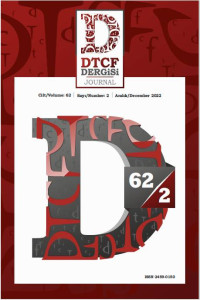Abstract
At first glance Nights of Plague, a novel by Orhan Pamuk, seems like the story of a plague, it actually tells about the political transformation that has gained momentum after administrative problems and political crisis accelerated by the epidemic, though. The epidemic that started in 1901 created a political atmosphere activating the conditions in Minger at that time. Minger is an imaginary island in the Eastern Mediterranean ruled by the Ottoman Empire. Population mobility for several centuries has also accelerated the circulation of new ideas and movements, such as the contagion of epidemics. The demands of societies for equality and freedom led to popular revolts, coups and revolutions, further threatened traditional monarchies.
Although Nights of Plague is a candidate for the political novel classics of the modern age, it is considered and evaluated as a historical novel. Its author, Orhan Pamuk, seems to be leading this trend. This approach condemns the novel to an incomplete and limited evaluation. Therefore, this study engages in a discussion focusing on two issues. The first part dealt with the question why Nights of Plague should be read as a political novel. In the second part, the prominent aspects of national historiography, which focuses on the fictional world of literature, and its political background, are discussed through Nights of Plague.
References
- Anderson B. (1995). Hayali Cemaatler Milliyetçiliğin Kökenleri ve Yayılması (İ. Savaşır, Çev.). İstanbul: Metis Yayınları.
- Antakyalıoğlu, Z. (2013). Roman Kuramına Giriş. İstanbul: Ayrıntı Yayınları.
- Arendt, H. (2018). İnsanlık Durumu (B. S. Şener, Çev.). İstanbul: İletişim Yayınları.
- Aristoteles (1987). Poetika (İ. Tunalı, Çev.). İstanbul: Remzi Kitabevi.
- Baumann, G. (2006). Çok Kültürlülük Bilmecesi: Ulusal, Etnik ve Dinsel Kimlikleri Yeniden Düşünmek (I. Demirakın, Çev.). Ankara: Dost Yayınları.
- Belge, M. (1975). Siyasal Roman. Birikim Dergisi, Sayı:9, 40-47.
- Berktay, F. (2016). Politikanın Çağrısı. İstanbul Bilgi Üniversitesi Yayınları.
- Çelebi, A. (2001). Risk ve Olumsallık: Sosyal Teori- Sosyal Felsefe İlişkisini Anlamaya Yönelik İki Anahtar Kavram. Ankara Üniversitesi SBF Dergisi, 56(1): 23-52.
- Eldem, E. (2021). Tarih Bir Ada’ya Sığar mı? Kitap-lık, S. 215, İstanbul: YKY, 19-27.
- Gellner, E. (1992). Uluslar ve Ulusçuluk (B. E. Behar & G. G. Özdoğan, Çev.). İstanbul: İnsan Yayınları.
- Hobsbawn E.J. (2006). 1780’den Günümüze Milletler ve Milliyetçilik (O. Akınbay, Çev.). İstanbul: Ayrıntı Yayınları.
- Hutcheon, L. (2020). Post Modernizmin Poetikası Tarih, Teori, Kurgu (Y. Balcı, Çev.). Ankara: Hece Yayınları.
Abstract
İlk bakışta bir veba hikayesi gibi görünen Orhan Pamuk’un Veba Geceleri aslında salgının ivmelendirdiği yönetim ve siyaset kriziyle birlikte büyüyen bir siyasal dönüşüm romanıdır. 1901 yılında baş gösteren salgın, Osmanlı Devleti’ne bağlı Doğu Akdeniz’de hayali bir ada olan Minger’de zamanın içinde barındırdığı koşulları aktive eden bir siyasal atmosfer yaratır. Birkaç asırdır süregelen nüfus hareketliliği, salgınların bulaşı gibi yeni fikir ve hareketlerin dolaşımına da hız katmıştır. Toplumların eşitlik ve özgürlük yönündeki talepleri halk isyanlarına, darbe ve devrimlere yol açarken geleneksel monarşileri tehdit eden bir güce erişmiştir.
Modern çağın siyasi roman klasiklerine girmeye aday bir anlatısı olmasına rağmen Veba Geceleri tarihi roman türü içine dahil edilerek yorumlanmakta ve değerlendirilmektedir. Yazarı Orhan Pamuk da bu yönelime öncülük eder görünmektedir. Böyle bir yaklaşım, romanı eksik ve sınırlı bir bakışa mahkûm etmektedir. Bu nedenle çalışmada, iki meseleye odaklanan bir tartışma yürütülmektedir. İlk kısım Veba Geceleri’nin niçin siyasi bir roman olarak okunması gerektiği sorusu etrafında gezinmektedir. İkinci kısımda, Veba Geceleri üzerinden edebiyatın kurmaca dünyasına yaklaşan ulusal tarih yazımının öne çıkan yanlarıyla birlikte siyasal arka planı tartışmaya açılmaktadır.
References
- Anderson B. (1995). Hayali Cemaatler Milliyetçiliğin Kökenleri ve Yayılması (İ. Savaşır, Çev.). İstanbul: Metis Yayınları.
- Antakyalıoğlu, Z. (2013). Roman Kuramına Giriş. İstanbul: Ayrıntı Yayınları.
- Arendt, H. (2018). İnsanlık Durumu (B. S. Şener, Çev.). İstanbul: İletişim Yayınları.
- Aristoteles (1987). Poetika (İ. Tunalı, Çev.). İstanbul: Remzi Kitabevi.
- Baumann, G. (2006). Çok Kültürlülük Bilmecesi: Ulusal, Etnik ve Dinsel Kimlikleri Yeniden Düşünmek (I. Demirakın, Çev.). Ankara: Dost Yayınları.
- Belge, M. (1975). Siyasal Roman. Birikim Dergisi, Sayı:9, 40-47.
- Berktay, F. (2016). Politikanın Çağrısı. İstanbul Bilgi Üniversitesi Yayınları.
- Çelebi, A. (2001). Risk ve Olumsallık: Sosyal Teori- Sosyal Felsefe İlişkisini Anlamaya Yönelik İki Anahtar Kavram. Ankara Üniversitesi SBF Dergisi, 56(1): 23-52.
- Eldem, E. (2021). Tarih Bir Ada’ya Sığar mı? Kitap-lık, S. 215, İstanbul: YKY, 19-27.
- Gellner, E. (1992). Uluslar ve Ulusçuluk (B. E. Behar & G. G. Özdoğan, Çev.). İstanbul: İnsan Yayınları.
- Hobsbawn E.J. (2006). 1780’den Günümüze Milletler ve Milliyetçilik (O. Akınbay, Çev.). İstanbul: Ayrıntı Yayınları.
- Hutcheon, L. (2020). Post Modernizmin Poetikası Tarih, Teori, Kurgu (Y. Balcı, Çev.). Ankara: Hece Yayınları.
Details
| Primary Language | Turkish |
|---|---|
| Journal Section | Research Article |
| Authors | |
| Early Pub Date | December 15, 2022 |
| Publication Date | December 20, 2022 |
| Submission Date | April 29, 2022 |
| Published in Issue | Year 2022 Volume: 62 Issue: 2 |
Ankara University Journal of the Faculty of Languages and History-Geography is licensed under Creative Commons Attribution 4.0 International (CC BY 4.0).

